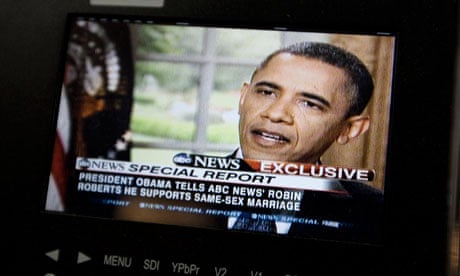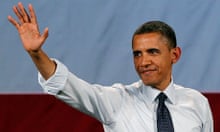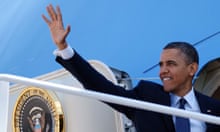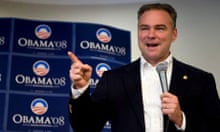In an interview on ABC News Wednesday, President Obama, after several years of expressing opposition to same-sex marriage and then coyly describing his position as "evolving", expressed his support for it. In a one-on-one interview, he told Robin Roberts:
"It is important for me to go ahead and affirm that I think same-sex couples should be able to get married."
To understand the significance of Obama's action, a bit of historical context is required. In 1996, the British writer Andrew Sullivan published a book, Virtually Normal, which advocated legal recognition of the marriages of same-sex couples. So radical was that idea back then – a mere 16 years ago – that very few gay citizens, and almost no gay groups, endorsed it. Instead, Sullivan told me, "I was actually picketed at book stores" by one gay group, which "had placards with my face on them and cross-hairs placed in between my eyes." And, he recalled, the Human Rights Campaign Fund (the nation's largest LGBT advocacy group) "refused to use the word marriage until the new millennium."
Indeed, Sullivan's book was published the same year that an overwhelming, bipartisan majority of the US Senate enacted, and President Bill Clinton signed into law, the so-called Defense of Marriage Act (Doma), which barred the granting of any federal spousal benefits (immigration, tax, estate, and hundreds of others) to same-sex couples. Two years earlier, another large bipartisan majority of Congress, along with President Clinton, banned openly gay citizens from serving in the US military.
In the mid 1980s, the US supreme court upheld the constitutionality of state laws criminalizing same-sex relations, with the court's chief justice, Warren Berger, approvingly quoting Blackstone's condemnation of gay sex as an "infamous crime against nature". As the Aids epidemic exploded, President Ronald Reagan, for years, refused even to speak of it because it was mostly gay victims who were dying. The writer Edmund White yesterday recalled:
"As a man in his 70s, I grew up in an era when homosexuality was still an offense in some states punishable by death."
In sum, as recently as the 1980s and 1990s, the country was headed in the direction of aggressively denying the most basic rights to gay citizens. Marriage equality, a definitively fringe position, was on virtually nobody's radar.
Pervasive anti-gay discrimination in the US endures to this day. Doma is still valid law, denying same-sex couples every federal spousal right to which opposite-sex couples are entitled (as a result, there are thousands of gay Americans unable to live in their own country with their foreign national spouse). Same-sex marriage is recognized in only seven of the 50 states. On Tuesday, the day before Obama expressed his support for marriage equality, the state of North Carolina – which Obama won in 2008 – approved a ballot measure to ban both same-sex marriage and civil unions by a landslide majority.
This is why it is genuinely historic that Obama, in the midst of a difficult re-election campaign, chose to become the first US president ever to support same-sex marriage (former Vice-President Dick Cheney, citing his lesbian daughter, did so when running for re-election in 2004). One can question Obama's sincerity; some believe his reliance on gay donors and need for greater enthusiasm among his core voters was his motive. One can quibble with his rationale; some have criticized him for suggesting that states have the right to ban same-sex marriage if they wish. But one cannot reasonably question the importance of his act.
Obama's public defense immediately enshrines same-sex marriage as the official orthodoxy of the Democratic party. It is inconceivable that marriage equality will ever again retreat to the fringe. His willingness to embrace it in the midst of an election year signals a belief that the American public is ready to accept this position as perfectly mainstream, even if they disagree with it. It will undoubtedly enable – or pressure – other world leaders to support the same view.
Perhaps the least quantifiable impact of Obama's statement is the most important one: it is a powerful message to gay youth that their sexual orientation is neither a flaw nor an abnormality. As White wrote yesterday:
"The stigma of being gay drove my age-mates and me toward drink, suicide and years on the psychoanalytic couch in an effort to go straight. We were wracked with self-hatred, which blighted so many lives of our friends."
This stigma, devastating in so many ways, is surely lessened when the nation's highest elected official advocates for full legality for same-sex couples.
This week, gay Americans and their allies predictably, and understandably, expressed their glee, along with a not insubstantial amount of shock, at seeing their full legal equality publicly embraced by an American president. But the reaction of the right wing is more telling. Obama's GOP opponent, Mitt Romney, re-affirmed his opposition to both same-sex marriage and civil unions, but did so with reserved rhetoric and a very tepid tone, betraying a belief that same-sex marriage – once an electoral gold mine for his party – is unlikely to hurt Obama's electoral chances.
US media coverage Thursday has been fixated on the micro aspects of Obama's announcement: his motives, how it will affect the election, the role that internal administrative divisions played in his decision. But 20 years from now, none of that will matter. The historic event is that same-sex marriage, for the first time, now has a supporter in the Oval Office.
There are many disappointments and truly bad acts for which President Obama is responsible, but for one day at least, on this single issue, he demonstrated authentic and important leadership on a civil rights issue that affects millions.




